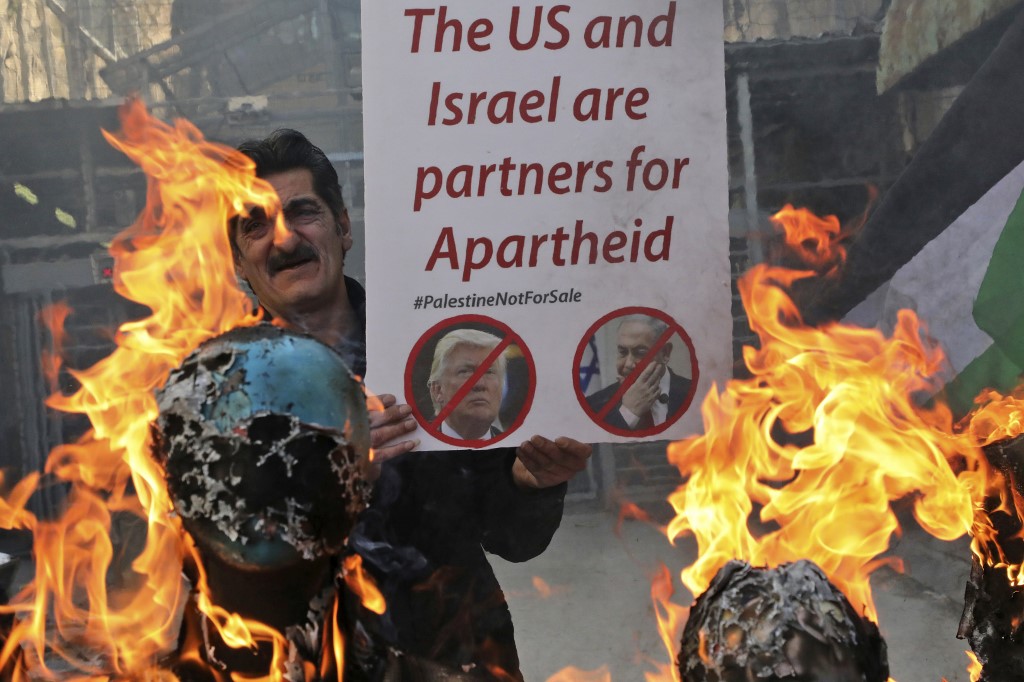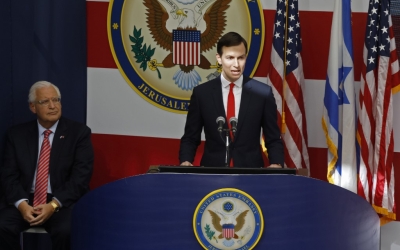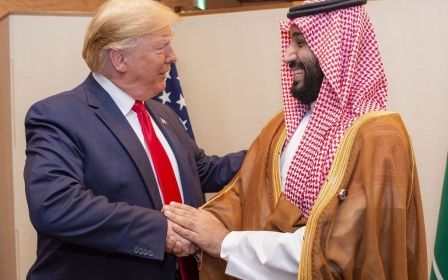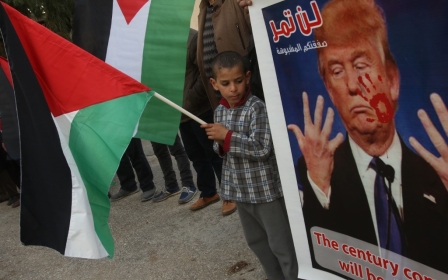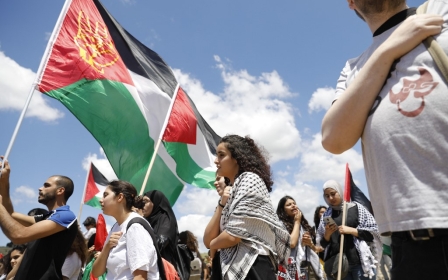Why Palestinians deserve a new leadership
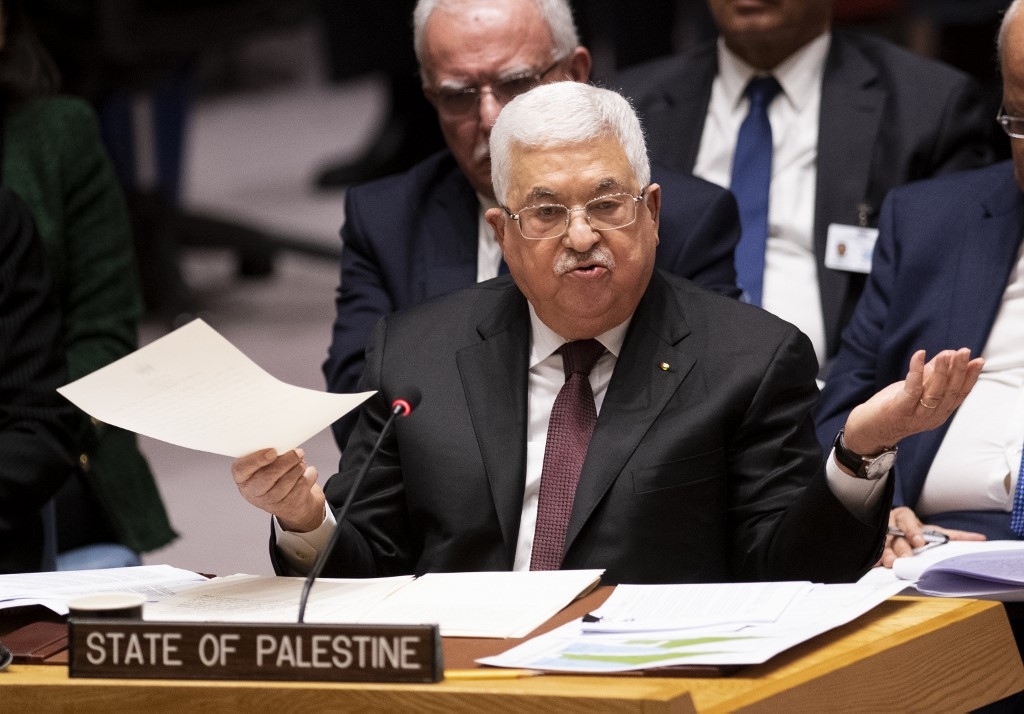
A month since US President Donald Trump announced his “deal of the century" with Israeli Prime Minister Benjamin Netanyahu by his side, Palestinians must stop beating around the bush - before Israel claims even that as part of its biblical homeland and a security imperative that it must maintain.
Israel is drunk on power, staggering from one illegal act to another, thinking nobody will challenge anything it does because it is supported blindly and completely by Washington.
While the architects of the deal have not found biblical or imaginative contemporary ways to make Palestinians disappear, the aim of their plan is to re-educate those they can’t expel so that they confess to being trespassers in their own homeland, before going on to acknowledge the love they feel for the occupiers who guarantee their security.
The Palestinian people have rejected Trump and Netanyahu's beloved document, as have their supposed leaders in Ramallah and Gaza. But more could have been done more to demonstrate this rejection and those leaders have plenty of questions to answer.
Faced with an existential threat, where were all the global mass demonstrations in which Palestinians and their supporters brought world capitals to a halt, or at least forced national media to acknowledge and cover their anger?
Abbas talks the talk about popular resistance, but has provided no leadership to allow it to happen
I understand that in many Arab countries, now a long way down the path of normalisation with the world’s only 21st-century apartheid state, there is a fear of coming out in support of the Palestinian cause. Just look at Saudi Arabia’s clampdown on Palestinians, either for their political affiliations or for raising the arrests as an issue.
A major demonstration took place in Ramallah on 11 February to coincide with a speech by Palestinian Authority (PA) President Mahmoud Abbas to the UN Security Council. It was not suppressed by the PA’s security forces, but others have been, as Palestinian security forces continue coordinating with Israel to protect Israeli settlers.
More imaginative ways of raising awareness over the costs of the occupation have come through mass dawn prayers in Nablus and Hebron, and at al-Aqsa Mosque. As in 2017, when Israel restricted access to al-Aqsa but was forced to retreat after mass prayers outside its gates, the power of prayer appears capable of challenging Israel more than Abbas’s UN speeches.
Lack of vision
Abbas talks the talk about popular resistance, but has provided no leadership to allow it to happen. The PA’s response to Trump’s deal has been woefully inadequate. Instead of mobilising Palestinians and organising a popular, peaceful uprising, Abbas has regurgitated existing positions without offering a new strategy to combat the fundamental changes that have taken place since Trump took office.
If securing rejection of the deal from the Arab League and the Organisation of Islamic Cooperation comprise the limits of the PA’s pushback, then Netanyahu can sleep soundly.
The Palestinian leaderships in Ramallah and Gaza are comfortable. Abbas can rely on the traditional funders of the PA to continue to support it, because they have no alternative leadership knocking on the door. The head of Mossad reportedly travelled to Qatar several weeks ago to secure further funding for Hamas.
Palestinian citizens of Israel are preoccupied with a third set of elections in a year, having to chose whether to engage with Israel’s “democratic” processes, while the Trump plan seeks to revoke the citizenship of at least 300,000 Arab residents of the Triangle region, in Israel's north.
Meanwhile, millions of Palestinian refugees in Jordan, Syria and Lebanon continue to wrestle with their daily lives, while the Trump plan not only excludes them from any future peace deal, but seeks to erase their label as refugees and to find a solution to their predicament outside of their homeland.
Diaspora ignored
At the same time, Palestinians in the diaspora are largely excluded from formal representation in Palestinian institutions. When the diaspora tries to organise, the Palestinian leadership pooh-poohs their efforts, rather than engaging in good faith.
Three years ago, the Popular Conference for Palestinians Abroad was launched in Istanbul to try to provide Palestinians in the diaspora a voice, but the PA leadership opposed it and smeared this effort as a Hamas front. Other longstanding initiatives, such as the Palestinians in Europe Conference, have also been shunned and smeared by the leadership.
The same strategy has also been evident in South America, where the PA has tried to hijack Palestinian communities rather than engage with them in good faith.
The Palestinian status quo - a lack of strategy, failed leadership and lack of vision for reclaiming control of the national liberation project - needs disruption. This is unlikely to come from within our historic homeland, due to the difficulties outlined above.
Palestinians outside the homeland must strengthen the institutions they have been building, while also coordinating with Palestinians inside historic Palestine - acting as one people from one land, working for freedom, justice and equality. A promising initiative that should fall under this umbrella is the Palestine Forum, which brings together Palestinians from around the world to think and plan.
Monumental shift
We need a vision that challenges the Palestine Liberation Organization (PLO), which claims to be the sole legitimate representative of the Palestinian people, but in reality does not fulfil this role.
We must stop beating about the bush and reclaim the initiative - not only from Israel, but from our own failed leadership
The PLO leadership should then be given a year to reform or face a challenge to its legitimacy from a new body. During that year, the new organisation would be built, bringing together the various initiatives that have been shy to challenge the PLO on their own, but could do so collectively, having sought endorsement from Palestinian groups and individuals worldwide.
This would be a monumental shift, but one that has become necessary due to a monumental failure of leadership. It pains me to say this about a leadership that has some good people in it, but we must stop beating about the bush and reclaim the initiative - not only from Israel, but from our own failed leaders.
The views expressed in this article belong to the author and do not necessarily reflect the editorial policy of Middle East Eye.
Middle East Eye propose une couverture et une analyse indépendantes et incomparables du Moyen-Orient, de l’Afrique du Nord et d’autres régions du monde. Pour en savoir plus sur la reprise de ce contenu et les frais qui s’appliquent, veuillez remplir ce formulaire [en anglais]. Pour en savoir plus sur MEE, cliquez ici [en anglais].



